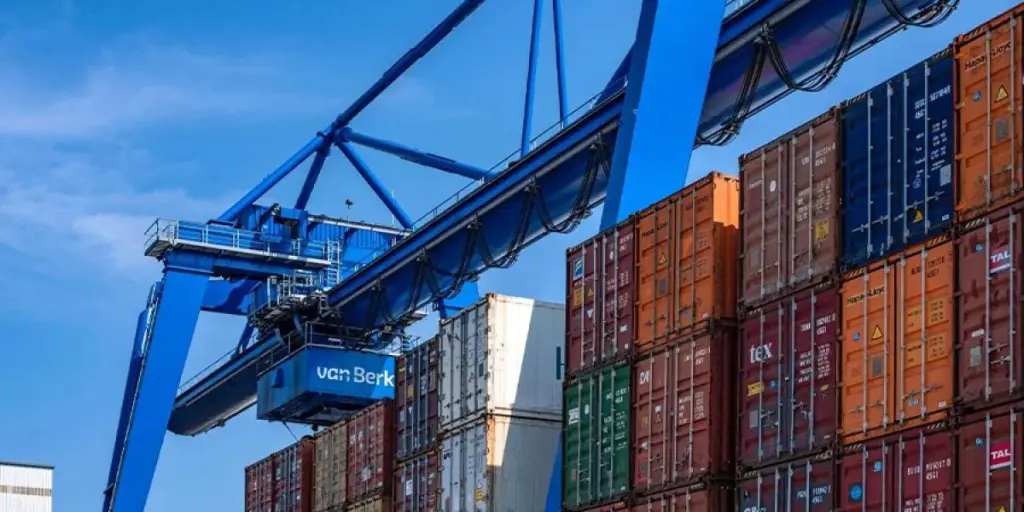Many of us did not expect 2024 to be a record-breaking year, yet it seems to have plenty more surprises in store. Scientists have declared March 2024 as the warmest March ever recorded, continuing 10 straight months of record global temperatures.
In particular, the push for quick, expedited delivery is seen as the main driver that not only speeds up shipments but also escalates the environmental toll. Read on to discover the downsides of expedited shipping and the importance of evaluating it with a holistic approach.
Table of Contents
1. Expedited shipping and its metrics
2. Critical downsides of expedited shipping
3. Holistic metrics approach for overall evaluation
4. Balancing speed and resilience
Expedited shipping and its metrics

Overview of expedited shipping
Expedited shipping, commonly known as express delivery or express shipping to general consumers, is a logistic service that offers an exceptionally quick delivery timeframe, especially when compared to standard shipping services, which can often take several days or even up to a few weeks. In contrast, expedited shipping may take as fast as 1-2 days or even offer overnight delivery that ensures packages are delivered the next morning.
This service is crucial for any users or industries that require fast delivery to meet tight deadlines, providing a solution that combines speed with real-time tracking for enhanced visibility and control over freight movements.
Thanks to advanced tracking software and applications available today, expedited shipping not only meets urgent needs but also offers peace of mind through continuous updates and logistical transparency. This method of shipping is now integral in today’s fast-paced market, serving as a favorite option for urgent, time-sensitive deliveries. Additionally, it also functions as a premium delivery choice, frequently employed to attract customers and offered as an exclusive member-only benefit.
Importance of holistic metrics

Plato’s famous quote: “The part can never be well unless the whole is well” serves as a profound metaphor for organizational success, particularly in the context of business performance or, more specifically, overall business health. Just as every organ in a well-functioning body must perform optimally for the body to thrive, in a business, each function or component works together for the enterprise to thrive.
For instance, holistic metrics are essential when evaluating the implementation or decision to incorporate expedited shipping into a business’s logistics strategy. The adoption of a comprehensive approach to performance measurement is crucial, involving multiple metrics that provide a well-rounded view of supply chain health and aid in making informed decisions. This approach allows businesses to assess not only the immediate benefits but also the long-term implications across various fronts. By integrating and analyzing data from different aspects of the supply chain, companies can better gauge expedited shipping in terms of delivery speed, cost efficiency, and return on investment.
It’s also vital to recognize that the importance of these metrics should extend beyond merely measuring the speed or cost of delivery. Multiple operational and customer satisfaction factors, including the pros and cons of the entire logistics operations, should be evaluated too. Metrics that provide insights into fuel consumption, emissions data, and alternative delivery methods, for example, are essential for businesses committed to sustainability. Meanwhile, monitoring other metrics, including On-Time In Full Rate (OTIF) metrics and the relevant KPIs, helps gauge the effectiveness of expedited shipping strategies, providing a full view of delivery success rates and areas needing improvement.
Additionally, expedited shipping can potentially justify the investment too if it can ensure on-shelf availability of high-demand products, which in turn leads to increased sales and customer loyalty. Such holistic metrics help align shipping strategies with broader business goals, ensuring expedited decisions matching optimal operation mode and carrier selection.
In short, leveraging holistic metrics to evaluate expedited shipping is indispensable for modern businesses aiming to ensure that the benefits of faster delivery services are maximized while managing costs, customer impact, and environmental sustainability. Businesses adopting a holistic approach to overall shipment performance can optimize supply chains and enhance shipping strategies accordingly for maximum efficiency and customer satisfaction.
Critical downsides of expedited shipping

Financial burdens and resource constraints
The high costs associated with expedited shipping, particularly for services promising same-day or next-day delivery, can significantly reduce profit margins and tie up working capital. Funds that could otherwise be available for strategic usage, such as financial planning and budgeting, become inaccessible due to the much higher costs of expedited shipping services, hence placing considerable stress on a business’s financial resources.
From the perspective of overall profit margins and financial management, the costly expedited shipping service often increases operational costs, leading to either inflated product prices or squeezed profit margins. This becomes especially challenging if shipping complexities escalate. In a nutshell, the cost disparity between expedited and standard delivery is substantial, making the former much more expensive and less sustainable as a long-term strategy.
Customer satisfaction risks

Customers appreciate quick delivery, yet expedited services such as overnight or one-day shipping can unexpectedly compromise product availability. This reliance often leads to stockouts when there are delays or disruptions in the shipping process, subsequently deteriorating customer satisfaction. Rather than enhancing loyalty, these issues may foster significant dissatisfaction due to unfulfilled promises, potentially damaging the brand’s reputation.
At the same time, stockouts—as a direct consequence of expedited shipping—not only frustrate customers but also highlight issues within supply chain management related to demand forecasting and safety stock planning. The pressure for fast delivery reveals deficiencies in inventory management and the precision of demand predictions, undermining confidence in the company’s overall competence and efficiency when products are not available as promised.
As expedited shipping necessitates precise and swift supply chain operations, it further amplifies the risk of stockouts. This creates a challenging environment with minimal margin for error, leaving little room to rectify mistakes before they affect product availability and customer trust. In short, expedited shipping can introduce significant risks to customer satisfaction by increasing the likelihood of stockouts and exposing supply chain vulnerabilities, which can erode trust and loyalty, impacting the brand adversely.
For instance, if expedited shipping ensures on-shelf availability of high-demand products, leading to increased sales and customer loyalty, the investment may well be justified.
Moreover, holistic metrics help in aligning shipping strategies with broader business goals. They ensure that the decision to expedite aligns with established business metrics, guaranteeing the best possible mode and carrier selection. This alignment is crucial for maintaining a competitive edge in the market. For example, if a company’s key performance indicator is customer satisfaction, expedited shipping might be prioritized for products with a history of high demand volatility.
Operational inefficiencies and planning challenges
Implementation of expedited shipping services is often subject to significant logistical adjustments that can strain existing processes, with a high potential for introducing logistical complexities, especially in swiftly handling and processing orders. Various operational challenges, such as improper load matching, inadequate real-time data, and poor communication, can impede operational efficiency in fulfilling expedited shipping demands. The intense urgency to complete expedited shipments on time to meet tight deadlines can result in rushed orders or incomplete tasks, which may precipitate mishaps and disrupt operational flow.
Consequently, this high operational pressure is almost certainly a drawback in both the logistical execution and emotional well-being of the operation team. For example, concerns over delivery staff or driver fatigue and safety, coupled with the increased demands on operations to remain punctual, can engender errors and operational lapses, affecting overall operational integrity. While stockout issues might indicate forecasting inaccuracies, the more profound systemic problems obscured by the operational and planning challenges induced by expedited shipping are significant. These reveal underlying inefficiencies in the entire inventory management and planning system, which, if unaddressed, can result in operational bottlenecks.
Environmental and sustainability challenge

Compared to standard, consolidated or slower shipping methods, expedited shipping involves significantly increased transportation speeds and frequencies. This results in higher carbon emissions and a larger environmental footprint, conflicting with sustainability goals and potentially the business’s commitment to eco-friendly practices.
Over time, the accelerated pace of expedited shipping is also subject to more fuel and resources, continuously contributing to greater environmental impacts and raising concerns about the sustainability of such operations. This approach can strain natural resources and intensify emissions, requiring a critical review of logistical strategies. To align expedited shipping practices with broader environmental and sustainability goals, companies must consider innovative logistics solutions. These solutions should minimize environmental impact while still satisfying consumer demand for rapid delivery.
Holistic metrics approach for overall evaluation
Financial health and operational efficiency

When adopting a holistic approach to expedited shipping services, it is essential to consider both financial and operational dimensions. A comprehensive set of metrics must evaluate the cost-efficiency of expedited shipping, determining if the financial investment is justified by gains in delivery speed and customer satisfaction.
Understanding the cost implications involves assessing both the direct expenses and the broader impact on the company’s financial health and operational concerns. Effective management of expedited shipping requires robust tracking of financial metrics such as costs and profits, along with operational metrics like delivery speed and order accuracy. For instance, expedited trucking services, typically involved in last-mile delivery, necessitate monitoring direct and indirect costs, including fuel consumption, vehicle maintenance, and driver wages, to gauge their financial viability and operational impact.
In terms of operational efficiency, businesses should extend their focus beyond mere expedited shipping to optimize their supply chain management comprehensively. This strategy aims to enhance delivery times in a cost-effective manner, integrating tactical-level decision-making in expedited shipping to maximize total profit. Ultimately, the holistic metrics approach accentuates the significance of meticulously considering operational costs, fuel consumption, and vessel chartering in financial evaluations, thereby ensuring a balanced and efficient shipping strategy that aligns with broader business objectives.
Customer and market impact

Beyond the fundamental financial and operational considerations, a comprehensive review of expedited shipping must also evaluate its impact on customer satisfaction and trust. It is equally important to ensure that expedited shipping not only meets delivery expectations but also enhances the customer experience without compromising service quality. This involves assessments that gauge the influence of timely deliveries on customer loyalty and the overall reputation of the company, which are vital for maintaining competitive advantage in the market.
To accurately measure this aspect, monitoring customer satisfaction and gathering feedback on expedited shipping services are essential. Such feedback serves as a critical indicator of how effectively expedited shipping meets market demands and shapes customer perceptions, providing insights into its overall impact on market competitiveness and customer loyalty.
In general, in order to achieve desired customer outcomes through expedited shipping, the strategy should focus on realistic delivery commitments to uphold market credibility. Meanwhile, optimizing service frequencies and fleet deployment can indirectly boost customer satisfaction by potentially reducing waiting times and enhancing service reliability. Ultimately, a holistic approach in expedited shipping should align operational efficiencies with customer expectations to foster a positive market presence and ensure sustainable business growth.
Supply chain resilience and dependency
In the long run, understanding how expedited shipping influences supply chain resilience, especially in managing sudden spikes in demand or disruptions, is vital for maintaining robustness and dependency within the supply chain. This evaluation involves managing dependencies on timely deliveries, which are crucial for overall supply chain effectiveness and reliability.
As expedited shipping introduces numerous challenges from a supply chain management standpoint, effective management tactics such as enhanced forecasting and robust safety stock planning are essential. These strategies help mitigate the risks associated with rapid turnaround times, ensuring that the supply chain can support the swift pace without leading to stockouts and customer dissatisfaction.
The common pitfall of dependency on specific logistics partners and services due to a reliance on expedited shipping is preventable with strategic contingency planning. Essentially, a holistic approach to enhancing overall supply chain resilience should also incorporate factors such as vessel payload and fuel consumption, which are critical for planning under varying conditions and ensuring a sustainable operational framework.
Environmental and sustainability considerations

Equally critical, a comprehensive set of metrics must also account for the environmental impact of expedited shipping, integrating sustainability goals into the holistic metrics to ensure eco-friendly practices are consistently upheld. It is crucial to assess the environmental footprint of expedited shipping operations, considering the potential adverse effects on sustainability goals.
To effectively monitor this aspect, it is essential to focus on emissions and resource usage, analyzing the environmental impact of expedited shipping, including assessments of carbon footprint and other ecological effects. For shipments that involve ocean shipping, a comprehensive model should also take into account emissions both at sea and at ports, aiming to reduce environmental impact as part of the optimization process.
In conclusion, achieving balance and ensuring each component of the business is robust and sustainable are critical for long-term success and stability. By considering environmental impacts alongside other key performance metrics, businesses can ensure comprehensive oversight and smarter, more sustainable growth.
Balancing speed and resilience

The exploration of expedited shipping reveals its complex impact on business operations and environmental sustainability. Understanding the essence of expedited shipping alongside the deployment of holistic metrics allows for an in-depth assessment of its overall benefits and challenges. The importance of these metrics cannot be overstated as they provide a clearer picture of not just the immediate gains in delivery speed, but also the broader implications on operational and financial health.
However, the downsides such as financial strains, customer dissatisfaction, and environmental concerns call for a strategic reassessment. The challenge lies in finding a balance between resilience and speed, ensuring that the acceleration of shipping processes does not undermine the robustness of supply chains or the sustainability of business practices. Employing holistic indicators to gauge overall performance is crucial in navigating these complexities, fostering an environment where speed does not compromise thoroughness or responsibility.
Visit Chovm.com Reads often for more insights on managing the complexities of expedited shipping, industry innovations, comprehensive business updates, and a wealth of wholesale and ecommerce business ideas.

Looking for a logistics solution with competitive pricing, full visibility, and readily accessible customer support? Check out the Chovm.com Logistics Marketplace today.




